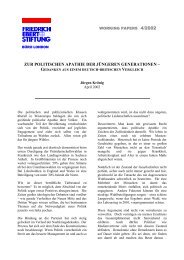Where Now for European Social Democracy? - Policy Network
Where Now for European Social Democracy? - Policy Network
Where Now for European Social Democracy? - Policy Network
You also want an ePaper? Increase the reach of your titles
YUMPU automatically turns print PDFs into web optimized ePapers that Google loves.
DOMINIQUE STRAUSS-KAHN 15<strong>Social</strong> expectations of the Welfare State have evolvedIn traditional social democracy, social expectations were at firstcollective: to improve the condition of the working class, and to betterredistribute the profits of labour. Today, our societies are expressing astrong demand <strong>for</strong> individual promotion. This is explained by anevolution of collective values: the growth of individualism, aspirations,and a stronger desire <strong>for</strong> personal accomplishment – and its rewards.This is further explained by the evolution of post-Fordist capitalism.Yesterday, workers were ensnared by a social class that woulddetermine their individual destinies. Today, with the decline of theidea of class, and the enfeeblement of collective identity, eachindividual plays their own hand. Everyone is responsible <strong>for</strong> theirprofessional development, <strong>for</strong> his or her success or failure. This isexplained by the democratisation of education, a very recent process. InFrance, between 1987 and 1997, the median age <strong>for</strong> finishing educationpassed from 19 to 22 years of age; the number of those with a bachelor’sdegree has more than doubled from 30 per cent to 63 per cent.These expectations of individual success and social promotion aredeceptive. <strong>Social</strong> mobility is feeble in our societies: inequalities ofdestiny are vast. Statistics show an unbelievable stability in thereproduction of inequalities. Intergenerational inequalities aregrowing: social mobility is even weaker, the chances that a worker’schild will become an executive are still slim. <strong>Social</strong> mobility is evenweaker than it was in the past: in 1960, a French worker could expectto attain the salary of an executive in 30 years; today it would take 150... Contemporary society has a less justifiable level of inequality thanduring the middle of the twentieth century. Today’s discourse createsterrible frustration because it leads us to believe that all responsibilityis personal, in other words: if you fail, it’s your own fault. Classconsciousness is disappearing and the social structures that went withit are fading. Since the democratisation of education has mostbenefited families of modest means, it is this group who will suffermost from disillusionment.The Welfare State responds badly to the new social expectations.It was constructed to regulate the relations between classes. It rests



